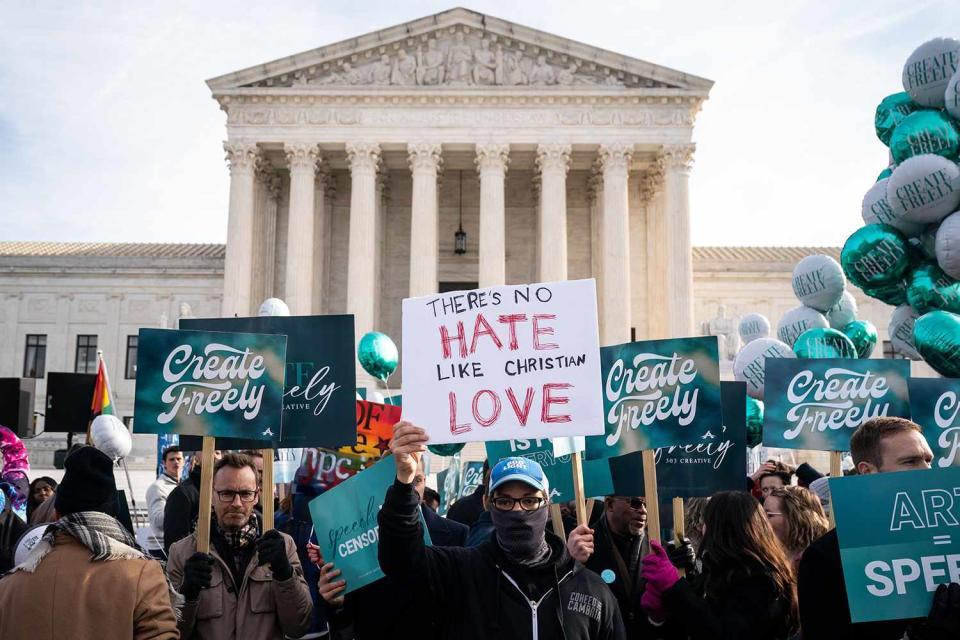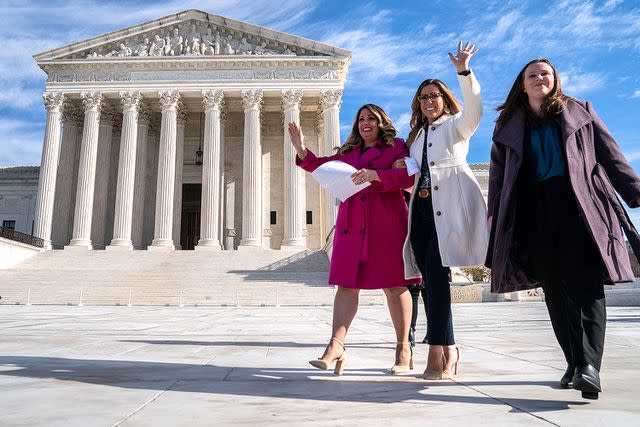Supreme Court Closes Out Pride Month with Major Blow to LGBTQ+ Rights, Opening Door for Broader Discrimination
- Oops!Something went wrong.Please try again later.
'303 Creative LLC v. Elenis' was a highly hypothetical case in which Christian web designer Lorie Smith sought permission to refuse to build wedding websites for same-sex couples

Kent Nishimura / Los Angeles Times via Getty Images
Protestors for and against the right to LGBTQ+ discrimination gather outside the Supreme Court in Dec. 2022 as justices hear oral arguments in '303 Creative LLC v. Elenis'The Supreme Court has sided 6-3 with a Christian web designer in landmark LGBTQ+ rights case 303 Creative LLC v. Elenis, which immediately opens the door for further discrimination against the queer and trans community.
The court was tasked with considering the case of Lorie Smith, a website designer who owns 303 Creative and wanted to challenge a Colorado law prohibiting businesses from discriminating against LGBTQ+ customers.
Smith, whose case was built largely around a hypothetical scenario, argued that she should not be forced to design wedding websites for LGBTQ+ clients because creating messaging that she disapproves of would violate her religious beliefs and right to free speech.
Smith sued Colorado in an attempt to block the enforcement of its anti-discrimination law. Despite the preemptive nature of her complaint, as she has not yet designed wedding websites or had to turn away same-sex couples, the Supreme Court agreed to hear the case.

Kent Nishimura / Los Angeles Times via Getty Images
Lorie Smith (left), owner of 303 Creative, prepares to speak to supporters after the Supreme Court heard oral arguments in her case on Dec. 5, 2022In its decision on Friday morning, the Supreme Court held that "the First Amendment prohibits Colorado from forcing a website designer to create expressive designs speaking messages with which the designer disagrees."
With the landmark ruling — which falls in line with many of the SCOTUS justices' conservative stances — a precedent has now been set that in certain instances, U.S. businesses can legally deny their services to LGBTQ+ people under the First Amendment.
Trump-appointed Justice Neil Gorsuch, who authored the court's opinion, wrote, "In saying this much, we do not question the vital role public accommodations laws play in realizing the civil rights of all Americans. This Court has recognized that governments in this country have a 'compelling interest' in eliminating discrimination in places of public accommodation. ... At the same time, this Court has also recognized that no public accommodations law is immune from the demands of the Constitution."

Liberal Justice Sonia Sotomayor authored the dissenting opinion, writing, "Today, the Court, for the first time in its history, grants a business open to the public a constitutional right to refuse to serve members of a protected class."
"Around the country, there has been a backlash to the movement for liberty and equality for gender and sexual minorities. New forms of inclusion have been met with reactionary exclusion. This is heartbreaking," Sotomayor wrote. "Sadly, it is also familiar. When the civil rights and women’s rights movements sought equality in public life, some public establishments refused. Some even claimed, based on sincere religious beliefs, constitutional rights to discriminate. The brave Justices who once sat on this Court decisively rejected those claims."
President Joe Biden weighed in on the court's decision Friday afternoon, stating, "In America, no person should face discrimination simply because of who they are or who they love."
He continued: "The Supreme Court’s disappointing decision in 303 Creative LLC v. Elenis undermines that basic truth, and painfully it comes during Pride month when millions of Americans across the country join together to celebrate the contributions, resilience, and strength of the LGBTQI+ community."
Biden also expressed concern that the ruling will have trickle-down effects beyond inviting discrimination against the queer and trans communities. "More broadly, today’s decision weakens long-standing laws that protect all Americans against discrimination in public accommodations — including people of color, people with disabilities, people of faith, and women."
Never miss a story — sign up for PEOPLE's free daily newsletter to stay up-to-date on the best of what PEOPLE has to offer.
303 Creative v. Elenis echoes the 2018 Masterpiece Cakeshop v. Colorado Civil Rights Commission case, in which the Supreme Court sided 7-2 with a baker who refused to make a wedding cake for a gay couple. During that case, the couple told PEOPLE: "We don’t want another loving couple to have to go through what we did. It’s not about the cake; it’s about us being discriminated against because we’re gay."
The two dissenting justices in the 2018 ruling were Ruth Bader Ginsburg and Sotomayor. Ginsburg wrote in her dissent that the cake shop owner "declined to make a cake he found offensive where the offensiveness of the product was determined solely by the identity of the customer requesting it."
For more People news, make sure to sign up for our newsletter!
Read the original article on People.

